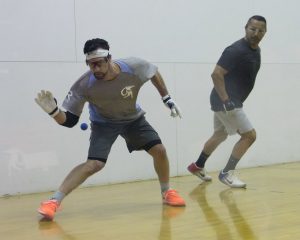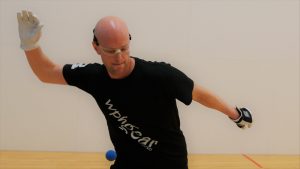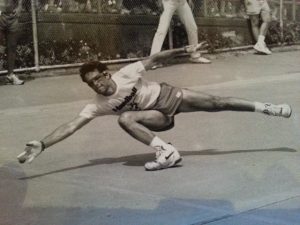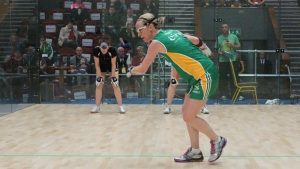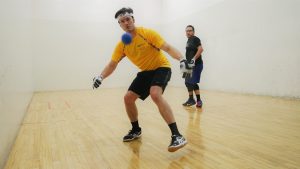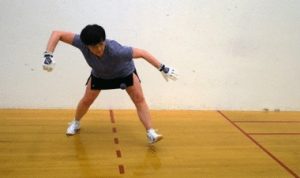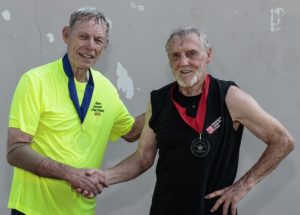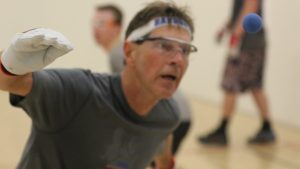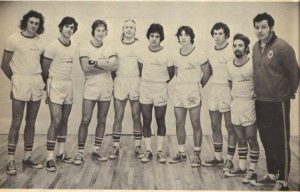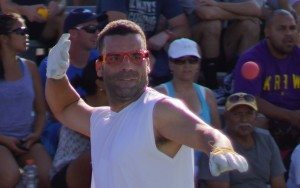Wrap Around with Dr. Dan Zimet, Sport Psychologist
Do you have a question about the greatest game played with a ball? Send it to Dr. Zimet at MDHandball@hotmail.com. For more articles (and additional mental strategies) go to www.WPHLive.tv, menu option ‘Wrap Around’.
“Whenever I have a tournament coming up I can feel super wound up, sometimes for days or even weeks before the event…it effects my sleep, my appetite. Any advice on how to calm these obsessive nerves?”
It’s a week before the tournament and you’re already feeling anxious. The butterflies started as soon as you signed up, but now they seem to have spread to your back and neck. Your life is hijacked by nerves and negative thoughts. You try to distract yourself by watching TV and hanging out with other players, but your mind keeps wandering… “What if I play terribly? What if he’s just too good and embarrasses me on the court? What if I lose – or lose badly? I’d feel ashamed.” Getting keyed up for a match is normal – and necessary – in order to compete. But debilitating worry can have catastrophic effects on your ability to play at your best.
Although we will review some ‘quick tips’, making a deep and lasting impact into your pre-event nerves starts with self-awareness. Ask yourself, “what am I afraid of? Disappointing others? Being embarrassed or ashamed of my performance? Losing money, ranking points or status?” Try to put into words the thoughts and emotions that accompany your pre-event anxiety. Consider journaling these thoughts or, if you’re more ambitious, talk to another handball player or even a Sport Psychologist. Through introspection and understanding your fears, you can begin to create a healthier mindset about competition and expectations.
For many, it helps to take a broader perspective and redefining your goals away from ‘winning’ and towards being a ‘complete competitor.’ Remember that handball is something you do. It’s not who you are. Dr. Maher, a Sport Psychologist in professional baseball, encourages writing down your values (in and out of handball), the reasons those values matter to you, and what behaviors you exhibit demonstrating those values. Returning to these values can help you gain perspective on your personal ‘why,’ or what’s really important to you.
Solid preparation, or ‘readiness to compete’, is a great weapon against pre-event anxiety, and it gives you the best opportunity to be at your best. Assess your long-term preparation in three domains: conditioning, fundamentals, and mental strength. Conditioning refers to your physical preparation, including strength, endurance, weight, flexibility and speed. Fundamentals refer to the skills of the game, including serve, return, offense (pass, kill), defense, strokes (e.g., overhand, punch), game-play IQ, anticipation and specific shot execution. Mental strength refers to having the most constructive mindset about and during competition and includes motivation, focus, self-confidence, and overall state-of-mind on and off the court. As you gather information about these three areas of the game, honestly evaluate yourself in terms of strength and weakness.
Now, as you prepare for a tournament, you can focus on “controlling the controllable.” Of the three areas of focus mentioned, conditioning is the most controllable followed by fundamentals. Make sure you have confidence in your training and put in the time, particularly in the month leading up to an event. Work on a setting some SMART goals (Specific, Measurable, Attainable, Relevant, Time-limited) to develop your conditioning and fundamentals. In so doing, you’ll develop an excellent argument against those intrusive negative thoughts. For example, “I’ve prepared well for this tournament – I took care of my health and I’m proud of my conditioning.” Or “I’ve taken care of arriving at the court ready to play.” Use constructive arguments when the anxious thoughts kick in. While self-talk may feel uncomfortable at first, it really helps!
For the day and hours leading up to your match, make an effort to have a routine and then stick to it. Take the stress out of choices by knowing who you’ll be with (positive people), what and when you’ll be eating, how to get back to your room and asleep at the right time the night before, and what you’ll need to do the day of the match to be in the right physical and mental state when walking onto the court. Make sure everything you’ll need is prepared and laid out, including all your gear and other essentials like fluids, energy gel, etc. Professional athletes have a set schedule and routine that includes complete hydration, light warm-up and stretch, balanced calorie consumption, and focusing exercises to keep them at the right energy level and frame of mind to peak at the first serve.
Now, for those Quick Tips:
Find more challenges – There is no better cure for anxiety than exposure to the stress you fear. Try playing in more tournaments. If that’s not possible, try ramping up the challenge of your practice games by playing different opponents on a different court with higher stakes. As much as possible try to mirror the intensity of your tournament matches to your practice matches.
Words matter! Interpret pre-game jitters as readiness to play, rather than fear or worry. Everyone gets hyped before a game. Embrace the competitive edginess by re-defining your anxiety into more constructive terms – like “psyched up, excited, eager for the challenge…” Your internal language defines your experience.
Calm your body and your mind will follow – Use breathing exercises or find a guided mindfulness exercise on YouTube. Other useful tools include yoga, prayer, meditation, visualization and reciting a positive mantra such as “I will play with poise and excellence.”
Park your life. It’s OK to compartmentalize your life as a person and as a player. “Park” your life when you’re entering the club by putting aside your personal concerns and responsibilities. Pick them up again when you leave, and “park” the player by not expending negative energy obsessing about your performance.
Trouble sleeping? Consider experimenting (before the tournament!) with some gentle sleep aids, such as melatonin or an herbal supplement like Kavinace. Stay away from prescription sleep aids and some anti-anxiety drugs (e.g., Xanax, Ambien) as these can leave you foggy-headed the next day.
Be prepared and have a game plan. Watch video, talk to other players, or reflect on the general abilities of your opponent. Come up with three positive strategies for the match. These can be general (e.g., keep him moving) or specific (e.g., use a high left lob for your second serve). Always use strategies you’ve already practiced – never try something new in a tournament situation.
Musings from the Masters
Sean Lenning, Tucson, AZ. b. 1985. Seventeen National Open 3-wall titles (9 singles & 10 doubles), Worlds Open 1-wall title. Prefer to play outside
Since your symptoms seem to be more extreme than normal pre-competition jitters, it’s probably a good approach to start from the ground up. Reading Thich Nhat Hanh’s book, “The Miracle of Mindfulness” could benefit you (or anyone prone to anxiety) greatly if you actually live it. It sounds like you just need some serenity in your life and you’re certainly capable of acquiring it. Another idea would be to focus on breathing deeply throughout the day and especially before and during a match. It’s very hard to be nervous when you’re truly focused on your breath and it’s healthy to do so anyway.
Albert Apuzzi, Brooklyn NY. B. 1955. Handball Hall of Fame, Twenty National Open 1-wall titles, 32-time Open finalist. Prefers 1-wall small ball.
As players become more experienced these symptoms usually disappear. Getting in shape & sharp beforehand is a good way to ease your mind. Learn to channel any nervousness in a positive direction.
John Robles, Phelan CA. b1965. Highest professional ranking #3. 15 National Masters titles, 4 Worlds titles, 1 Canadian Master Title, Southern California Hall of Fame. Prefers indoors (but I also love outdoors)
Nerves could be from lack of preparation and confidence in ability. I always trained and planned for a ‘Pre-week’ ritual prior to any tournament. This should consist of working out, rest, eat well, hydrate, stretch and get plenty of sleep. You can condition and train yourself to peak, both mentally and physically days prior to the tournament. Take 2-3 days off prior and mentally prepare. You should be well rested, energized and ready to play. Visualize your win and how you play to win then execute the win.
Fiona Shannon, Belfast Ireland. B.1978. 9 Irish National Open titles, 2 US National Open Singles titles, 3 Worlds Open titles (3 Singles, 2 Doubles), 18 All Ireland senior titles. Prefers 40×20.
Personally, for me if I wasn’t on the toilet at least a few times the morning of a big game I’d have been worried. This routine for me meant the butterflies and adrenaline were there and I was ready to perform. Nerves are good and natural and deep breathing and relaxing shoulders helped me
Emmett Peixoto, Pinole, CA., b. 1982. Highest professional ranking USHA #1 2007/2008; 5 National Open titles: 3-wall singles (2), 3-wall doubles, 4-wall doubles (2). Prefers 3-wall small ball.
Nerves prior to a tournament match are a completely normal response to a much-anticipated event. Even the most prepared athletes will experience nerves prior, and sometimes during, a high level match. The goal of the athlete is to allow these nerves to work for them rather than against them. If nerves are keeping you up all night the night prior to an important match, the nerves are working against you. If nerves enable you to focus on the match at hand, they are working for you. Regardless if your nerves are working for or against you, what is crucial for the athlete to understand is that their nerves arise because the match, or how they perform in the match, is important to them. If the match or the tournament were not important to them, nerves would not be an issue. Understanding this fact is the first step toward allowing nerves to work for you rather than against you.
If you are experiencing nerves prior to a tournament and they are keeping you up the night prior to a big match, the best thing to do is recognize that how you fare in the tournament is meaningful to you. You want to play well and play at your best. Whether you prepared properly and are staying up because you are excited or if you did not prepare properly and are nervous about playing up to your standards, remember that ultimately you are playing in the tournament because you want to do well and/or win. Nerves are energy. They can be harnessed and directed into better play.
The following are a few useful tips, which have proved effective for me, on how to direct your nerves in a positive direction.
Prior to a big tournament, it is useful to get into a nightly routine. For example: attempt to get into bed about the same time every night. Eat a dinner that you would commonly eat. Do a few stretches and take a shower or bath. Follow the shower up with a few minutes of visualization, picturing yourself playing well and hitting great shots, winning the tournament. Begin to wind down by reading a book or watching a show. Take some valerian root, or drink some chamomile tea if you need some extra help getting to sleep at a reasonable time. When you get to the tournament, follow this exact routine. You should even bring your common foods with you or go to a grocery store when you arrive at the host city. By making your nightly routine exactly the same, you will be able to feel more comfortable when nerves arise. If you are unable to calm down and keep thinking about the match, attempt to push it out of your head. You want to play well and you are doing everything you can to play well, including sleeping and staying calm. If you are unable to push the thoughts out of your head, make all of your thoughts positive, i.e., hitting perfect shots, controlling center court, acing serves, etc. If your nerves are going to keep you up all night, at least you will be making them work for you by constantly envisioning positive results.
Put yourself into tournament like settings. When playing handball against your usual sparing partners, put something on the line, e.g., play for dinner or a protein drink. Play other sports or games that might make you feel awkward or uncomfortable and try to maintain focus and play well. For example, challenge your friends or family to Ping-Pong, go bowling, golf with strangers, play tennis, enter a basketball league, challenge someone to chess online, etc. The goal is to mimic excitable and uncomfortable feelings that may arise when playing in a tournament while attempting to thrive and focus with the feelings.
When you get to the tournament warm-up exactly like you do at home. Keep everything the same. When nerves arise, try to shape your nerves to create greater awareness. Take a deep breath between points and prior to serving. Focus on slowing down your swing and watching the ball all the way into your hand. Be aware of nothing besides how the ball feels on your hand as you hit it. Did you strike the ball perfectly into your sweet spot? Where did the ball hit your hand? Thoughts like this will drive the energy from your nerves back into the match. You love this game, you want to perform well, you will perform well, watch the ball, take a deep breath, enjoy.
LeaAnn Martin, Bellingham, WA., b. 1956, Handball Hall of Fame (2010), 20+ National and World titles in singles and doubles, played 4 wall.
There is a difference between nerves that can negatively impact performance and excitement and arousal that can enhance performance. The key is knowing the difference and being able to use it to your advantage. I have played some matches where I wasn’t nervous and not very motivated to play, and my performance reflected this. In other matches, particularly when I first started competing, my nerves got the best of me. Some point in the middle would allow me to play my best. Thus, if I felt nervous and anxious, I needed to calm myself. I tended to fall back on my training and preparation. I would tell myself I did all I could to get ready and I was in the best shape I could be in. Of course, the only way I could believe that was to actually do it, which meant doing all the things we know — drills, strength training, cardio training, lots of time in the court, etc. I did what I could to feel my best. I also had to be confident in my game plan — knowing what serves to serve and what to be ready for from my opponent. I am also a big believer in visualization — seeing myself hitting the good shots and playing well. Building this confidence helped me calm down and have fun playing.
G Michael Driscoll, Parker, TX. b. 1938. Twenty-five National Masters titles, 1, 3 and 4-wall, 9 Canadian Masters & 2 Worlds titles. Prefers 3-wall small-ball
Getting “…super wound up, sometimes for days or even weeks before the event …it affects my sleep, my appetite” indicates you are not focusing properly. Apparently, you are obsessed with losing and its implications as to your personal worth in the mind of others. Life is a constant struggle to improve. We don’t start life as perfect but our efforts should be toward becoming the best we can be.
Evaluate your opponents’ strengths and weaknesses and improve your overall play through practice and physical and mental conditioning to take advantage of their weakness. During the matches try your hardest to win but if (when) you lose take comfort in any improvement in your game and the fact that you never gave up. Enjoying the challenge, becoming fit and improving your skills should be reasons to compete, not just winning.
Vern Roberts Jr., Tucson, AZ. b 1954. Handball Hall of Fame, induction 2002. Preferred to play outside (prior to replacement parts)
If there’s one thing I’ve learned by playing lots of tournaments, it’s that playing lots of tournaments reduces the anxiety level. The old adage: “You are what you’re used to” certainly applies here as well as to the extra court time and extra effort that causes soreness in tournament play. Back in the day, I remember getting less anxious as the season progressed since there would be more tournaments under my belt.
That said: play more tournaments, play tougher games, and the rest will take care of itself. And, there is a tipping point to where you can be too calm as a little edgy nervousness certainly helps you play your best. On game day, a ritual can help – whether it’s a special breakfast, a shower before you play or whatever. On the first serve, hit a z-serve…as hard as you want. That can be calming and it will keep you from giving a back-wall setup on a drive serve that caroms out of the back corner.
Dave Dohman, Munster, IN. b 1956, Handball Hall of Fame, 2009. Nine National Open 3-Wall Doubles titles, 23 National Masters titles. Prefers 3-wall
I’ve found several approaches that helped me address “a calming of the nerves” prior to a big tournament or match. Number one priority was to practice or work out more for the simple reason of being tired and able to sleep better. Any additional playing/stretching/working out also gave me the self-assurance that I was as prepared as I could possibly be. Not over do it, but step up activity to be sure one is tired at the end of the day.
Get in a sleep routine. For me watching the evening news was usually the last event of the day. Then it’s lights out!
One last tip…..avoid alcohol!
Cesar Sala, Bronx NY. b 1977. Six National Open 1-wall titles (2 singles & 4 doubles), 1 Worlds Singles small ball. Prefers 1-wall small ball.
I used to struggle with sleep the night before a big event because my adrenaline would be through the roof! I couldn’t wait to get on the court but I knew I needed some good rest so I’d try to do something to distract myself from the tournament like watching a good comedy to relax. I can’t say that I ever had anything that really worked all the time except experience. After a while it became pretty routine and I started to sleep better as I got older. The funny thing is that some of my best performances came after very little sleep or no sleep at all! The truth is being prepared trumps everything. Having a steady routine that works and sticking with it is always the way to go.










